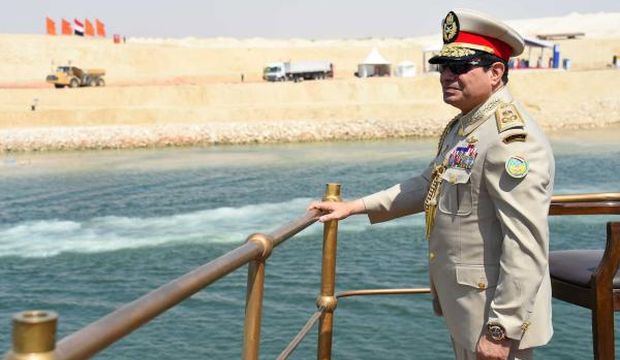The Muslim Brotherhood considers itself at war with the Egyptian regime. True to form, last week the group launched a massive media campaign to coincide with the inauguration ceremony for the new Suez Canal. The derisory and mocking tone of this campaign could be seen in a number of published articles and on social media outlets. But the Brotherhood has underestimated the significance of the new Suez Canal project.
We certainly know that the Brotherhood is in conflict with the government of President Abdel-Fattah El-Sisi, but it was still surprising that the group could simply not stand the idea of there being a new Suez Canal without their involvement. And so the group launched its relentless campaign in both the Arab and foreign media, belittling the project by refusing to refer to the newly built second thoroughfare as a canal, insisting it was only a mere “extension” that was not worth the investment. The campaign also claimed that President Sisi was not responsible for this impressive achievement, and that the whole project was the idea of ousted president and senior Brotherhood figure Mohamed Mursi.
In the end, the canal was dug and Egyptians enjoyed the lavish ceremony that followed. For the first time in the history of the canal, there will be simultaneous two-way traffic—along with faster shipping times. The project itself was completed in record time: less than a year, from planning to execution.
We have always known that the Muslim Brotherhood is the most experienced and organized opposition group in Egypt. They are known for their ability to manage their battles through the aggressive promotion of their ideas via the media while at the same time distorting their opponents’ image. However, this time, they seem to have chosen a battle they are destined to lose.
To tarnish the image of their opponents, the Brotherhood often chooses populist issues such as bread subsidies, the problems of public transport, power outages, or unemployment. In other words, they focus on negative topics that can rally people around them and gain them sympathy. Nevertheless, there is no reason to complain about the new Suez Canal as it represents an entirely different challenge. I believe the majority of Egyptians consider it a national project, not belonging to the president or his government—or even the political opposition. Impartial Egyptians view the new canal as more than a mere waterway; they are proud of the achievement and optimistic about the project’s future. Due to the Brotherhood’s campaign of ridicule and antagonism towards the new canal, millions of Egyptians ended up rallying behind the government.
During Mursi’s era the canal reflected ambiguity, chaos, and fear. Many were afraid that ships might be attacked. This is why many ships were forced to go around the Cape of Good Hope. As a result, insurance companies raised their premiums.
In stark contrast, today the canal reflects the political situation in Egypt. People are tired of instability and conflicts. They want to see tangible results, and not just promises, from the government. The new canal has become a political symbol—not to mention that it will help double the country’s revenues.
Despite the opposition’s antics, the threat of terrorism, and domestic and regional circumstances, the Egyptian government can now proudly proclaim that it has guaranteed international shipping and succeeded in digging a new canal with the support of allies who chose to invest in the project.
Every leader wants to leave a strong mark during his term in office. President Sisi made a shrewd move in choosing this particular project. The new Suez Canal is not a mere political endeavor which aims to raise spirits and enhance the government’s image; it is a tangible project, critical for international shipping, and one which bestows economic benefits to Egypt. It is also essential for the promotion of the country’s role both regionally and internationally.
Egypt needs to shift to a new paradigm. Indeed, the last major Egyptian undertaking of comparable scale during the past 10 years was the Toshka Lakes project in the Sahara—a project that quickly dried up before seeing the light of day. Several other major projects, such as planned touristic cities, also floundered. As for the canal, developers are not only aiming to increase the number of ships crossing through it, their objective is also to transform the surrounding area into a huge industrial zone for ships that also offer important navigation services for both the Mediterranean and the Red Sea.
The Suez Canal has always been the object of avaricious aggression, but Egypt has always stood firm against these enemies. The Brotherhood’s attempts to turn the Suez Canal into a lost battle will simply make the Brotherhood worthless—if they still have any worth left—because it is a national project.
For the world, the canal is also a strategic waterway whose international importance has steadily increased. Corridors, crossings, and waterways now make dangerous political tools. It is also vital for the passage of tankers, cargo vessels, and warships since it saves them as many as 10 days at sea compared with going around South Africa. The canal also represents the cohesion and resilience of the new Egyptian state, a year after Sisi came to power and made a promise to build the second Suez Canal.
Now, the “battle for the new Suez Canal” has ended. The opening ceremony has been concluded and ships have navigated through the thoroughfare—and all of this happened in front of the people of Suez and the entire world.
